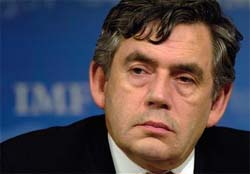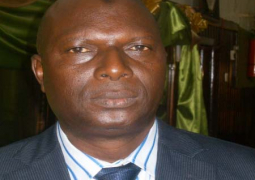
As G20 Agrees Global Fiscal Stimulus
Despite the fact that the G20 Finance Ministers comprising the group of leading nations once again agreed in London to a written report to keep "pumping fiscal stimulus into the global economy until there is guarantee'' that recovery from the recession was secured, Africa is still in the limelight.
However, such agreement is a support for Prime Minister Gordon Brown's call for such fiscal stimulus which the former Chancellor strongly believes could help see the way out of the current recession.
Undoubtedly, Africa once again failed to disappear from the world leaders' lips and pages of leading newspapers and magazines for the simple reason that stakeholders are with the conviction that the continent cannot be over-sighted during this crucial period of our history. Some European countries are already out of the rescission, and thus exert pressure on the other nations to follow suit.
Previously the G8 even extended the summit to not only include Africa but gave the continent priority, and as a result certain African leaders were then either invited or consulted. Various experts unanimously agreed that the current recession will "hurt Africa more than anywhere else'' and efforts must be done to see to it that the continent's demand is viewed with care.
Interestingly, according to the G20 Finance Ministers, bankers' bonuses which have been a bone of contention over the months should now be rescheduled and instead "reward long-term success rather than short-term risk-taking.''
In a draft proposal circulated to the press, ministers backed the idea from the UK as an alternative to a formal cap on bonuses sought by some countries. Ministers also said they would continue financial support for the global economy.
Britain is always proud of its contributions whenever Africa is concerned and once again Prime Minister Gordon Brown was praised by independent groups for the $20bn three-year package which Britain confirmed will contribute.
Prime Minister Brown had earlier said: "We won't flinch from the difficult decisions that will be necessary and we will always act in accordance with our core values of fairness and responsibility''. Since then the UK Prime Minister maintained the frontline in-favour of such assistance, but still declined to criticise other countries for not meeting their Gleaneagles pledges. Brown had also argued that it was in the "world's interests'' to tackle hunger. He said: "We have a moral duty to Africa. If Africa remains a net importer of food ... we will not have food security for millions of people in Africa and across the world''.
Brown have equally argued the moral part of it and believes that "it makes absolute sense for Britain and others to support agriculture in Africa'', and despite the pessimism by some other critics, the good news for Africa is that Finance Ministers meeting in London equally agrees with Gordon Brown, following the Prime Ministers pleas to continue measures to bolster economy and fulfills obligation to the continent.
Domestically, Gordon Brown and Chancellor, Alistair Darling Alistair, have said that boosting the economy must be balanced with public spending cuts to repay debt. However, he confessed that "hard choices" are to be made and that such hard choices also lay ahead in public spending, hence the importance to closely liase with the Financial Stability Board.
This particular Board with numerous functions will consider the issue of a "cap on bonuses'', which unfortunately is a "stumbling-block,'' according to economic experts, and since have the support of several European countries, not Britain and the USA.
The draft also suggested that they had failed to reach agreement on whether bank bonuses should be capped, although global standards are to be set for curbing pay, including measures to ensure that bonuses are clawed back for subsequent poor performance.
Brown still stands firm and insisted that "pay and bonuses cannot reward failure or encourage unacceptable risk-taking," but according to experts he also declined to back a cap.
Anyone may be in a dream world if he thinks that the critics will fade away and thus they still insisted that they need to see evidence from other rich countries in contributing their own shares as there is "little chance that rich countries would keep the promises they made at a similar meeting four years ago'' - to double their aid to $50bn (£30bn) annually by the following year.
It is important to note that both US President Barack Obama and Gordon Brown have pledged to increase their contributions before such a deadline.
Action-Aid and other charity and Non-Governmental Organisations last year maintained that the "G8 is on course to miss the $50bn target, if there is any form of shortcoming in such contribution and further reminding leaders that would be another failure for the world's poor''.
When contacted a well-known economic consultant in London who has keen interest in African Affairs told the Point: "Despite the so-called gloom and doom or the high expectation from the other side of the world, I can assure you that the world's richest nations may failed to meet their landmark pledge made at the 2005 Gleneagles summit to double aid to the poorest countries if certain measures are not taken seriously and immediately''.



